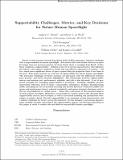Supportability Challenges, Metrics, and Key Decisions for Future Human Spaceflight
Author(s)
Stromgren, Chel; Goodliff, Kandyce E.; Cirillo, William; Owens, Andrew Charles; De Weck, Olivier L
Download20170009115.pdf (369.6Kb)
OPEN_ACCESS_POLICY
Open Access Policy
Creative Commons Attribution-Noncommercial-Share Alike
Terms of use
Metadata
Show full item recordAbstract
Future crewed missions beyond Low Earth Orbit (LEO) represent a logistical challenge that is unprecedented in human spaceflight. Astronauts will travel farther and stay in space for longer than any previous mission, far from timely abort or resupply from Earth. Under these conditions, supportability – defined as the set of system characteristics that influence the logistics and support required to enable safe and effective operations of systems – will be a much more significant driver of space system lifecycle properties than it has been in the past. This paper presents an overview of supportability for future human spaceflight. The particular challenges of future missions are discussed, with the differences between past, present, and future missions highlighted. The relationship between supportability metrics and mission cost, performance, schedule, and risk is also discussed. A set of proposed strategies for managing supportability is presented – including reliability growth, uncertainty reduction, level of repair, commonality, redundancy, In-Space Manufacturing (ISM) (including the use of material recycling and In-Situ Resource Utilization (ISRU) for spares and maintenance items), reduced complexity, and spares inventory decisions such as the use of predeployed or cached spares – along with a discussion of the potential impacts of each of those strategies. References are provided to various sources that describe these supportability metrics and strategies, as well as associated modeling and optimization techniques, in greater detail. Overall, supportability is an emergent system characteristic and a holistic challenge for future system development. System designers and mission planners must carefully consider and balance the supportability metrics and decisions described in this paper in order to enable safe and effective beyond-LEO human spaceflight.
Date issued
2017-09Department
Massachusetts Institute of Technology. Department of Aeronautics and AstronauticsJournal
AIAA Space and Astronautics Forum and Exposition
Publisher
American Institute of Aeronautics and Astronautics (AIAA)
Citation
Owens, Andrew, et al. “Supportability Challenges, Metrics, and Key Decisions for Future Human Spaceflight.” AIAA SPACE and Astronautics Forum and Exposition, September 2017, Orlando, Florida, USA, American Institute of Aeronautics and Astronautics, September 2017
Version: Author's final manuscript
ISBN
978-1-62410-483-1